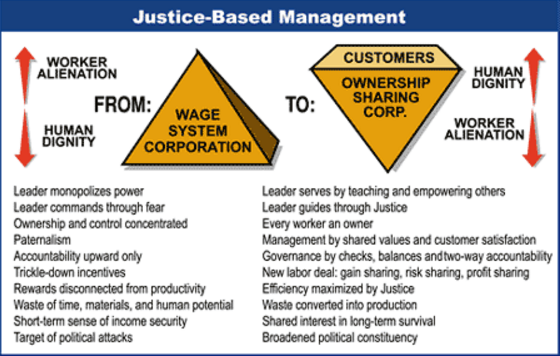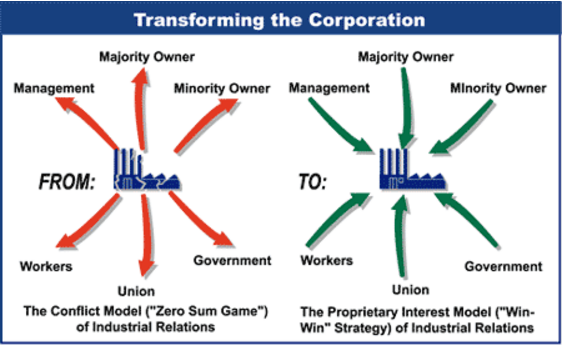In his testimony before the U.S. Senate in July 2002, Federal Reserve Chairman Alan Greenspan remarked that the problem of today’s free enterprise system is one of “infectious greed.” He also observed that the quality of corporate governance rests on the character of the corporate leader.
We agree. Our experience has taught us that the long-term success of any ownership culture depends largely on authentic leaders who inspire others through their values, vision and actions. The leader defines a culture and transmits values throughout the organization, working with others to create structures that promote the shared values and vision of the group. The authentic leader also strives to create new leaders and institutions to sustain the culture beyond his or her tenure or lifetime.
EEI assists the organization’s leader and core group to guide the transition to an ownership culture, gaining input and buy-in from all levels of the company, and introducing structures and processes to anticipate and address the challenges of leadership succession, business down-turn, and internal conflicts.
EEI’s employee stock ownership plans (ESOPs) and other expanded ownership systems embody the principles of “Justice-Based ManagementSM” (“JBMSMM”), a leadership philosophy and management system that applies principles of economic and social justice within business organizations. Worker ownership, in our view, is not some kind of village democracy but should have a representative form of governance with structured checks-and-balances, where leaders are transparent and accountable to all owners. We work with our clients to develop and maintain their ownership cultures, through custom-tailored processes and structures for:
- Ownership culture planning, implementation, and renewal
- Company-wide ownership education and communications
- Employee-monitored risk-and-reward compensation systems
- Anticipatory planning and crisis management
- Structures for stimulating and utilizing worker input and participation
- Governance and accountability structures
- Conflict resolution systems
One of EEI’s justice-based management innovations is the Employee Shareholders Association (ESA), first introduced for the creation of the Alexandria Tire Company of Egypt. The ESA serves as an ESOP-type vehicle to replace a trust, which may not be recognized under the laws of certain countries. More important, the ESA represents an advance over a trust, which is typically created by management and may not be operated democratically or in the best interests of the employees. The ESA allows for involvement of employee-elected representatives to participate in the design of the ESOP and the establishment of an ownership culture, as well as allowing worker-owners to have a formal voice within the governance of their company. The ESA also serves as the vehicle for channeling low-cost credit to finance the capitalization needs of the corporation while building the equity stakes of its worker-shareholders.


